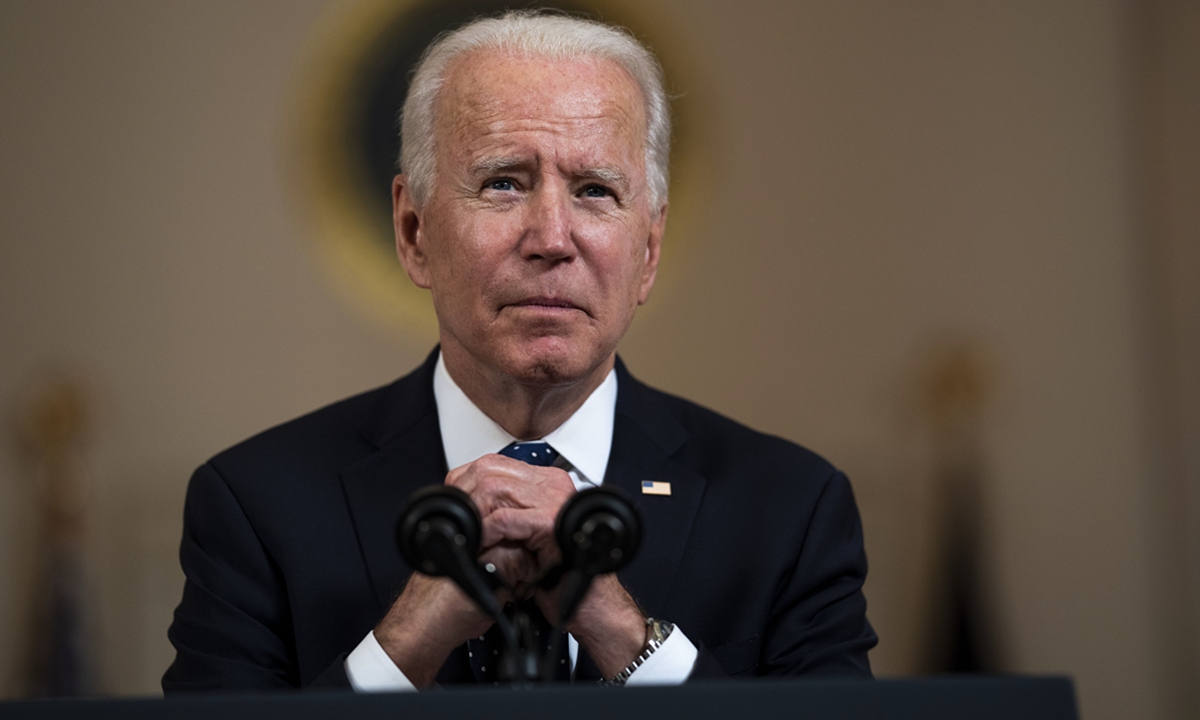Biden’s marijuana reform push to save midterm elections, yet sacrifices average Americans

US President Joe Biden Photo: IC
US President Joe Biden on Thursday granted a pardon to all people with federal offenses for simple marijuana possession, media reported. He said thousands of people with prior federal convictions could be denied employment, housing or educational opportunities and his executive action would relieve such "collateral" consequences.
Biden voiced support for some reforms like federal decriminalization of marijuana during his general election campaign in 2020. In the short term, with the midterm elections only a month away, Biden's rush to promote relative measures is undoubtedly motivated by the most pressing political consideration: efforts to make a gesture of fulfilling campaign promises and pay attention to voters' demands to win their approval, especially when many signs and analysis have shown that the Democrats are likely to lose their House majority in the upcoming midterm elections.
Biden can only pardon people who had possessed marijuana by his executive order, instead of fully legalizing it. In fact, according to a senior administration official, no one is in federal prison solely for simple possession of marijuana, which means Biden's action tends to help people with related criminal records who are denied housing, employment or educational opportunities. Without further action, the impact of this pardon alone will be relatively limited.
The House passed legislation in April to legalize marijuana nationwide, but the bill has yet to pass the Senate. By doing so, Biden is in effect giving central instructions to Democrat-dominated states, signaling that even if Democratic ideas do not pass Congress at the federal level, they will have to follow them in practice.
Lü Xiang, research fellow at the Chinese Academy of Social Sciences, told the Global Times that before the midterm elections on November 8, and even before the new Congress convened next year, it will be difficult for the legislators to pass any controversial bills similar to the one related to marijuana. As a result, Biden's pardon is a last ditch effort to build momentum and make a final push for the elections.
In the long run, it has been the consistent practice to push for ideas like legalizing marijuana in light of the diversity trends in American society and the so-called politically correct concepts. While the impact of marijuana on the average American over a long timeline is a rather complex and difficult question to answer precisely, this kind of unscrupulous pandering to diversity needs is bound to hurt low- and middle-income groups.
Marijuana is a kind of addictive drug which is broadly considered to pose significant risks to public health. If the US government continues to decriminalize marijuana at the federal level, it will finally empty out the savings and future of the average people and will lead to further impoverishment of the vulnerable.
In addition to marijuana, the US has the most prominent problem with misuse and abuse of fentanyl, an addictive opioid medication. In 2021, 75,673 overdose deaths from opioids in the US, primarily fentanyl, even exceeded the 58,220 Americans who died in the Vietnam War. Nevertheless, the US has been almost frantic in recent years to blame China, which holds a strong antipathy for narcotics than any other country and displays stringent controls on fentanyl substances among other narcotic drugs.
Obviously, this problem is entirely due to the tradition of prescription painkiller abuse within the US and the reasons behind, one of which is the promotion of legalizing marijuana.
It's time to recall former US president Donald Trump's speech on drugs: "...it's never going to be quite like China, I would say ... No matter what we do, no matter how tough we get, it won't be quite..." The lack of awareness of the dangers of drugs and the general call of legalizing recreational marijuana has led many people to associate drug use with "liberation" and "freedom", which may unfortunately result in more crime potential and degradation in American society.
The author is a reporter with the Global Times. opinion@globaltimes.com.cn

